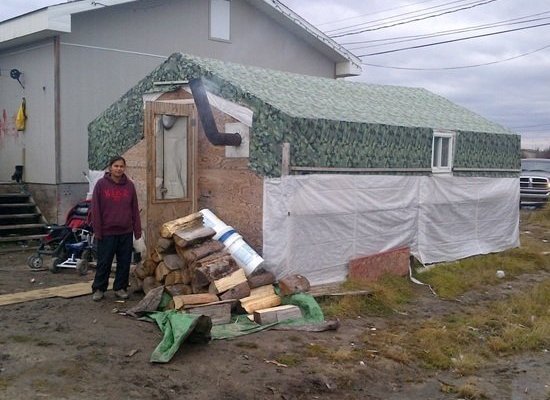 It's been three weeks since Attawapiskat First Nation took the extraordinary step of declaring a state of emergency. Since then, not a single federal or provincial official has even bothered to visit the community.
It's been three weeks since Attawapiskat First Nation took the extraordinary step of declaring a state of emergency. Since then, not a single federal or provincial official has even bothered to visit the community.No aid agencies have stepped forward. No disaster management teams have offered help.
Meanwhile temperatures have dropped 20 degrees and will likely drop another 20 or 25 degrees further in the coming weeks. For families living in uninsulated tents, makeshift cabins and sheds, the worsening weather poses serious risk.
Two weeks ago I travelled to this community on the James Bay coast to see why conditions had become so extreme that local leaders felt compelled to declare a state of emergency. It was like stepping into a fourth world.
I spoke with one family of six who had been living in a tiny tent for two years. I visited elderly people living in sheds without water or electricity. I met children whose idea of a toilet was a plastic bucket that was dumped into the ditch in front of their shack.
Dr. John Waddell from the Weeneebayko Health Authority was in the community during this tour. He was emphatic that conditions had deteriorated to the point that an emergency situation was unfolding. Families are facing "immediate risk" of infection, disease and possible fire from their increasingly precarious conditions. Dr. Elizabeth Blackmore repeated this message of immediate risk just this past Friday at a press conference at Queen's Park.
You'd think that a medical warning from a provincial health authority would move government into action. Think again. When it comes to the misery, suffering and even the death of First Nations people, the federal and provincial governments have developed a staggering capacity for indifference.
Try to imagine this situation happening in anywhere else in this country. We all remember how the army was sent into Toronto when the mayor felt that citizens were being discomforted by a snowstorm. Compare that massive mobilization of resources with the disregard being shown for the families in Attawapiskat.
Origin
Source: Huff
No comments:
Post a Comment